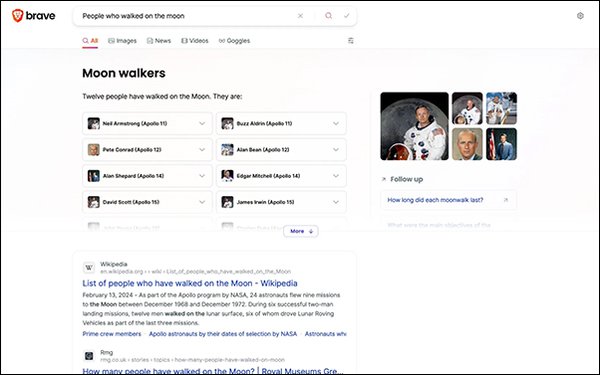
Brave, a privacy-focused company, has integrated
artificial intelligence (AI) into its search engine to create a real-time answer engine in a move that follows what Amazon Web Services (AWS), Google, Meta, Microsoft, Perplexity, and others have
accomplished.
“With the new Brave Search and its integration of Answer with AI, users get the best of both worlds — one place to get generative answers as well as up-to-date links,
providing instant and highly relevant results,” Brave Chief of Search Josep Pujol said in a statement.
The company is using large language models (LLMs), such as Mixtral 8x7B
and Mistral 7B with data from its search results and retrieval augmented generation (RAG) to generate answers almost instantly.
RAG -- the process of optimizing the
output of LLMs -- references an authoritative knowledge base outside of its training data sources before generating a response.
advertisement
advertisement
Brave Search receives 27 million
queries daily, making it one of the fastest-growing search engines since Bing, Pujol writes.
The engine is now available for all to use on desktop and mobile in English,
French, German, Italian, and Spanish. Responses to queries, however, may appear in English.
Pujol explains that the engine has an index of more than 20 billion pages, curated
and cleansed of search engine optimization (SEO) spam and junk content that that other indexes have.
Brave Search wants to provide not just answers, but an integrated system
to satisfy the multiple intents a user might have.
These intents fall into one of a handful of categories including queries for specific sites like Facebook or Twitter as well as
question-based queries or queries from those seeking information, which generally fall into two subcategories: specific lookups and question-like queries.
It also supports Queries with the
intent of finding or researching products and services, and those with the intent of completing an action like buying a product.
With Amazon Web Services, Meta, Google and Microsoft
launching similar AI-based search engines, there is a clear demand from users for this type of method to consume content through AI-augmented answers.
Delivering on this
demand can contribute to the erosion of incentives for publishers to put out content on the Web.
Pujol explains that the company will monitor the impact of AI-generated content on site
visits, and eventually will address the disruptions that could be caused by the drop in traffic to publisher sites.
Publishers have had concerns that the integration of AI into search
engines will eliminate the need to click through to their sites.